#Good omens conspiracy theory
Text
The circular bookshop rug CHANGES?!
(Edit: this is the rug that rests on top of the portal, under the chandelier. I think(?) there's only one of those!)
I saw someone mention this in a comment, but haven't seen any pics or discussion about it yet, so I checked. It's another inexplicable (ineffable?) "continuity" error:
S2e1, prepping to do the half miracles to hide Jim!Gabriel:
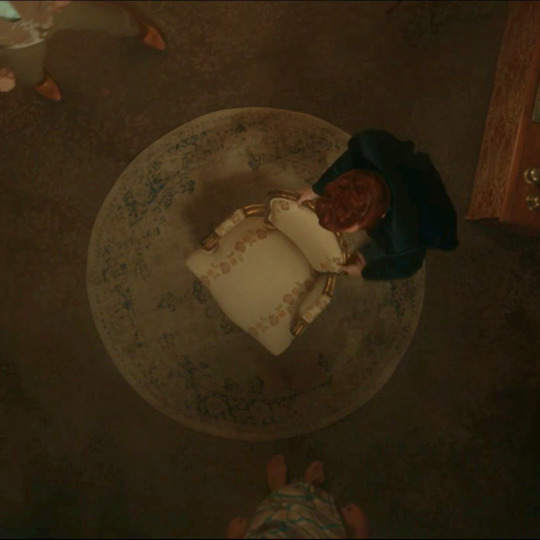
S2e5, as Nina enters the ball:

(More pics, including the season ONE rug, which was used for an s2 promo photo, and some discussion, below)
S2e5, prepping to defend the bookshop from the demons after Crowley walks most of the humans out:

S2e6, Crowley tidying the bookshop while Azi has a chinwag:
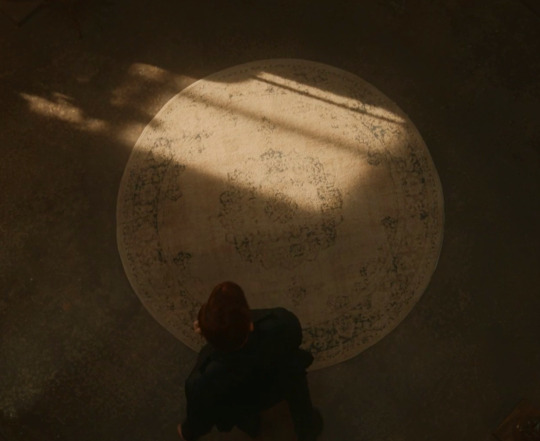
And sure, Aziraphale could have enchanted it to look more "Jane Austen-esque" for the ball, but then why did it change back in e6? It looks like Nina and Maggie's clothes for the ball stayed throughout e6, so it's not like the ball enchantments expired, Cinderella-style, or something...
Like the two different wigs for Crowley in Job, it seems superfluous to have two different rugs for the bookshop. And yet ...
It seems like it must be a Clue about something! Unreliable Narrator(s)? Another magic trick we didn't see? What do you think?
Edit 2: @rebeccasteventaylor had a good question about the rug in s1. I checked, and you'll perhaps be unsurprised to learn that the rug in s1e4, when Azi talks to Floating Head Metatron, is similar to s2e1 when they do the half miracle, but definitely not the same. The chairs also look similar but not exact:
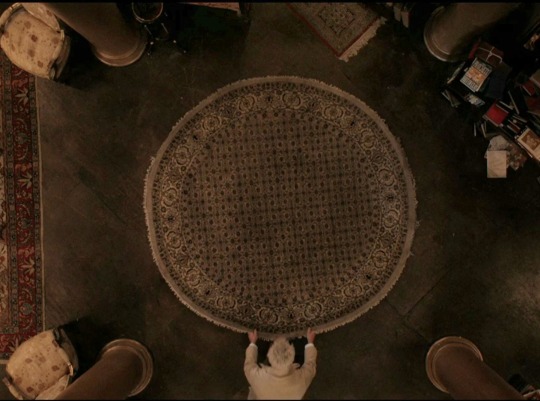
And here's a wider view of s1e4:
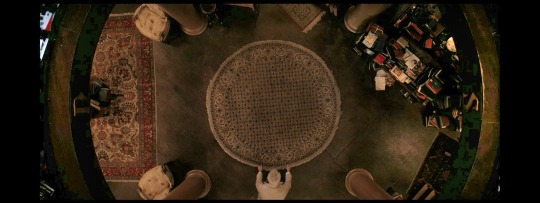
And a wider view of s2e1:
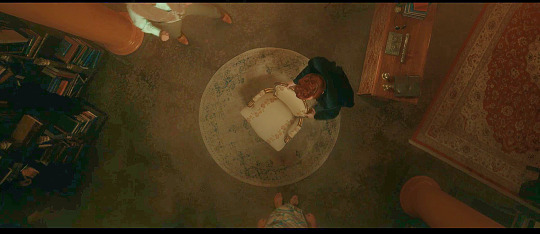
I understand they Actually Burned the bookshop and everything inside during s1, and then had to recreate it for s2 (there's a really wild post about recreating a hand painted antique tiled sink that talks more about that), so I don't know if the similar-but-not-exact chairs, big red rug, and round rug are more casualties of that, or are meant to look different...
Edit 3: EXCEPT. They USED the season 1 rug in season 2 promo photos!
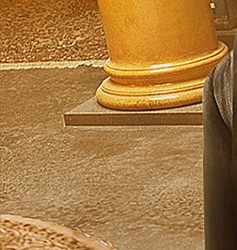
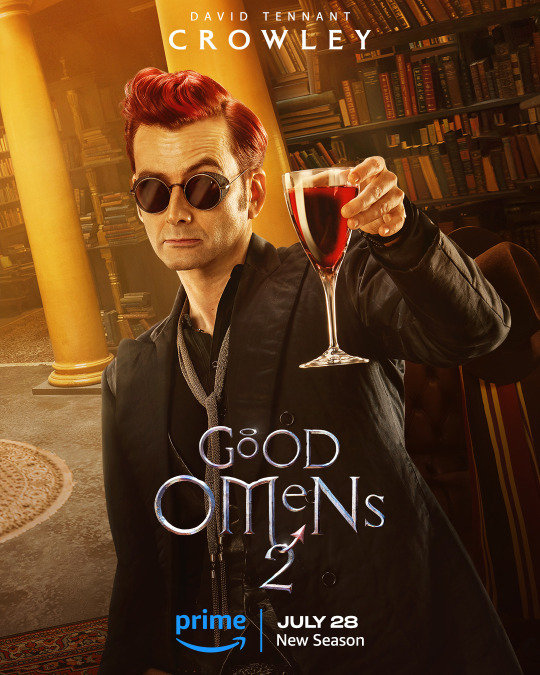

So... they didn't burn it? Or they did burn it and then they recreated it and didn't actually use it for s2??
I can't think or even breathe, this is SO WEIRD.
Interested in diving further into all the Good Omens mysteries? I have lots more of my own posts plus Clues and metas from all over the fandom, here.
#good omens analysis#good omens mystery#Aziraphale's rug#bookshop rug#good omens bookshop#clue with a capital C#good omens the ball#good omens magic trick#good omens#good omens meta#renew good omens#good omens 2#good omens continuity#unreliable narrators#Good omens conspiracy theory#Good omens truther#Good omens season 1#Good omens season 2#everything is meant
222 notes
·
View notes
Text
The fandom echo chamber: fanon, microanalysis and conspiracy brain
As someone who has been in fandom spaces, on and off, for 20 years, I find some fascinating trends popping up in the last decade that I thought to be fandom-specific but clearly aren’t. So, I would like to do a little examination of where those things come from, how they are engaged with, and what it says about the way we consume media. This is a think piece, of sorts, with my brain being the main source. As such, we will spend some time down the memory lane of a fandom-focused millennial.
This is largely brought about by Good Omens. But it’s also not really about Good Omens at all.
Part one. Fanon.
The way we see characters in any story is always skewed by our very selves. This is a neutral statement, and it does not have a value judgement. It’s simply unavoidable. We recognise aspects of them, love aspects of them, and choose aspects of them to highlight based entirely on our own vision of the universe.
Recognition comes into this. There is a reason so many protagonists of romance novels have a “blank slate” problem. Even when they do not, we love characters who are like us or versions of us that we would like to be. And when we say “we”, I also mean, “me”.
(I remember very clearly this realisation hit me after a whole season of Doctor Who with writing which I hated utterly when I questioned why I still clung so incredibly hard to Clara Oswald as my favourite companion. Then I looked at myself in the mirror. Oh. Well. That would do it, wouldn’t it?)
Then, there is projection, and, again, this is a neutral statement. Projection exists, and it is completely normal and, dare I say it, valid way of engaging with — well, anything. Is the character queer? Trans? Neurodivergent? Are they in love? Do they like chocolate? Are they a cat person? Well, yes, if this is what the text says, but if the text does not say anything… You tell me. Please, do tell me. Because, in that moment of projection, they are yours.
And then, there is fandom osmosis, and that is the most fascinating one of them all, the one that is not very easy to note while you are inside the echo chamber. It’s the way we collectively, consciously or not, make decisions on who or what the characters are, what their relationships are, and what happens to them.
(Back when I was writing egregiously long Guardian recaps on this blog I actually asked if Shen Wei’s power being learning actually was stated anywhere in the canon of the show. Because I had no idea. I have read and reread dozen of fanfics where that is the case, and at some point through enough repetition, it became reality.)
We are all kind of making our own reality here, aren’t we?
Back when things were happening in a much less centralised manner - in closed livejournal groups, and forums of all shapes and sizes - I don’t remember there being quite as much universally agreed upon fanon. Frankly, I don’t remember much of universally agreed upon anything. But now, everything is in one place: we have this, and we have AO3, and it’s wonderful, it really is so much easier to navigate, but it’s also one gigantic reality-shifting echo chamber, with blogs, reblogs, trends, and rituals.
Accessibility plays its part, too. If you were, say, in Life on Mars (UK) fandom between seasons, and you wanted to post your speculation fic, you had to have had an account, and then find and gain access to one of the bigger groups (lifein1973 was my poison, but ymmv), and then, if you feel brave you may post it, but also, you may want to do so from your alt account if you wanted to keep yours separate, and then you would have to go through the whole process again. And I’m not saying that fan creations then were somehow inherently better for it than fan creations now (although Life on Mars Hiatus Era is perhaps a bad example - because some of the Speculation Fic there was breathtaking), but there is something to say about the ease of access that made the fandoms go through a big bang of sorts.
(I mean, come on, I can just come here and post this - and I am certain people will read it, and this blog is a pandemic cope baby about Chinese television for goodness sake.)
The canon transformations that happen in the fandom echo chamber truly are fascinating to witness as someone who is more or less a fandom butterfly. I get into something, float around for a bit, then get into something else and move on. I might come back eventually when the need arises, but I don’t sustain a hiatus mind-state. This means that when I float away and return, I find some very intriguing stuff.
Let’s actually look at Good Omens here. Season two aired, and I found it spectacular in its cosy and anguished way; deliberately and intelligently fanfic-y in its plot building; simple but subversive, and so very tender. (I will have to circle back to this eventually, because, truly, I love how deliberately it takes the tropes and shatters them - it’s glorious). And, to me - a person who read the book, watched the first season, hung around AO3 for a few weeks and moved on - absolutely on-point in terms of characterisation.
So imagine my surprise when the fandom disagreed so vehemently that there are actual multi-tiered theories on how characters were not in possession of their senses. Nothing there, in my mind, ever contradicted any of the stated text, as it stood. This remained a strange little mystery until I did what I always do when I flutter close to an ongoing fandom.
I loaded AO3 and sorted the existing fic by popularity. And there it was, all there: the actual earth-shattering mutual devotion of the angel and the demon; willingness to Fall; openness and long heart-aching confession speeches. There was all of the fanon surrounding Aziraphale and Crowley, which, to me, read as out of character, and to one for whom they became the reality over the last four years, read as truth.
Again, only neutral statements here. This is not a bad thing, and neither this is a good thing, this is just something that happens, after a while, especially when there are years for the fandom-born ideas to bounce around and stew. I can’t help but think that so much of what we see as real in spaces such as this one is a chimaera of the actual source and all the collective fan additions which had time and space to grow, change, develop, and inspire, reverberating over and over again, until the echoes fill the entirety of the space.
Eventually, this chimaera becomes a reality.
Part two. Microanalysis
Here are my two suppositions on the matter:
1. Some writers really love breadcrumb storytelling.
Russel T Davies, for instance, on his run of Doctor Who (and, if you are reading it much later - I do mean the original one), loved that technique for his seasonal arcs. What is a Bad Wolf? Who is Harold Saxon? Well, you can watch very very carefully, make a theory, and see it proven right or wrong by the end of the season.
Naturally, mystery box writers are all about breadcrumb storytelling: your Losts and your Westworlds are all about giving you snippets to get your brain firing, almost challenging you to figure things out just ahead of the reveal.
2. We, as humans, love breadcrumbs.
And why wouldn’t we? Breadcrumbs are delicious. They are, however, a seasoning, or a coating. They are not the meal.
Too much metaphor?
Let’s unpack it and start from the beginning.
Pattern recognition colours every aspect of our lives, and it colours the way we view art to a great extent. I think we truly underestimate how much it’s influenced by our lived experiences.
If you are, broadly speaking, living somewhere in Western/North-Western Europe in the 14th century, and you see a painting in which there is a very very large figure surrounded by some smaller figures and holding really tiny figures, you may know absolutely nothing about who those figures are, but you know that the big figure is the Important One, and the small ones are Less Important Ones, and the tiny ones are In Their Care. You know where your reverence would lie, looking at this picture. And, I imagine, as someone living in the 14th century, you may be inspired to a sense of awe looking at this composition, because in the world you live in, this is how art works.
If you, on the other hand, watch a piece of recorded media and see the eyes of two characters meet as the violins swell, you know what you are being told at that moment. You don’t have to have a film degree to feel a sort of way when you see a green-tinged pallet used, when cross-cuts use juxtaposing images, or notice where your focus is pulled in any given shot. This stuff - this recognition of patterns - has been trained into us by the simple fact that we live in this time, on this planet, and we have been doing so long enough to have engaged recorded media for a period of time.
As humans, we notice things. Our brains flare up when they see something they recognise, and then we seek to find other similar details and form a bigger picture. This often happens unconsciously, but sometimes it does not. Sometimes we do it on purpose: finding breadcrumbs in stories is a little bit like solving a mystery. It allows us to stretch that brain muscle that puts two and two together. It makes us feel clever.
So yes, we love breadcrumbs, and, frankly, quite a lot of storytelling takes advantage of this. It’s very useful for foreshadowing, creating thematic coherence, or introducing narrative parallels and complexity. It’s useful for nudging the viewer into one or the other emotional direction, or to cue them into what will happen in the next moment, or what exactly is the one important detail they should pay attention to.
Because this is something media does intentionally, and something we pick up both consciously and not, it is very hard to know when to stop. We don't really ever know when all of the breadcrumbs have been collected. It becomes very easy to get carried away. There is a very specific kind of pleasure in digging into content frame by frame, soundbite by soundbite, chasing that pleasure of finding.
But it is almost never breadcrumbs all the way down. They are techniques to help us focus on the main event: the story. I truly believe those who make media want it to reach the widest possible audience, and that includes all of us who like to watch every single thing ever created with our Media Analysis Goggles on and those who are just here to enjoy the twists and turns of the story at the pace offered to them. And I think, sometimes in our chase to collect and understand every little clue we forget that media is not made to just cater for us.
One can call it missing a forest for the trees. But I would hate to mix my metaphors, so let’s call it missing a schnitzel for the breadcrumbs.
Part three. The Conspiracy Brain.
If you are there with me, in the midst of the excited frenzy, chasing after all those delicious breadcrumbs, then patterns can grow, merge together, and become all-encompassing theories. Let’s call them conspiracy theories, even though this is not what they truly are.
So, why do we believe in conspiracy theories?
One, Because We Have Been Lied To.
All conspiracies start with distrust.
If you are in fandom spaces - especially if you are in fandom spaces which revolve around a queer fictional couple - especially-especially if you have been in such spaces for a period of time, you have most certainly been lied to at one point or another.
We don’t even have to talk about Sherlock - and let’s not do that - but do you remember Merlin? Because I remember Merlin. Specifically, I remember the publicity surrounding the first season, with its weaponised usage of “bromance” and assertions that this whole thing is a love story of sorts, and then the daunting realisation that this was all a stunt, deliberately orchestrated to gather viewership.
And, because we were lied to in such a deliberate manner for such an extensive period of time, I genuinely believe that it forever altered our pattern recognition habits, because what was this if not encouragement to read into things? Now we are trained to read between the lines or see little cries for help where they might not be. Because we were told, over and over again, that we should.
(Yes, I think we are all existing in these spaces coloured by the trauma of queer-bating. I am, however, looking forward to a world where I can unlearn all of that.)
Two, Cognitive Dissonance.
The chain reaction works a bit like this: the world is wrong - it can’t possibly be wrong by coincidence - this must be on purpose - someone is responsible for it.
Being Lied To is a preamble, but cognitive dissonance is where it all originates. In so many cross-fandom theories I have noticed a four-step process:
A) this is not good
B) this author could not have made a mistake
C) this must be done on purpose
D) here is why
(Funny thing is, I have been on the receiving end of the small conspiracy spiral, and it is a very interesting experience. Not relevant to this conversation is the fact that a lot of my job revolves around storytelling. What is relevant is that my hobbies also revolve around storytelling. And one of them is DnD. Now, imagine my genuine shock when one of the players I am currently writing a campaign for noticed a small detail that did not make a logical sense within the complexity of the world, and latched on to it as something clearly indicating some kind of a secret subplot. Their thinking process also went a bit like this: this detail is not a good piece of writing — this DM knows how to tell stories well — this is obviously there on purpose. It was not there on purpose. I created a clumsy shorthand. I erred, in that pesky manner humans tend to. And, seeing this entire thought process recited to me directly in the moment, I felt somewhere between flattered and mortified.)
This whole line of thinking, I think, exists on a knife’s edge between veneration and brutal criticism, relentlessly dissecting everything “wrong”, with a reverent “but this is deliberate” attached to it like a vice, because it is preferable to a simple conclusion that the author let you down, in one way or another.
Three, Intentionality
I believe that there is no right or wrong way of engaging with stories, regardless of their medium, and assuming no one gets hurt in the process. While in a strictly academic way, there is a “correct” way of reading (and reading into) media, we here are largely not academics but consumers; consumption is subjective.
However, this all changes when intentionality is ascribed.
The one I find particularly fascinating is the intentionality of “making it bad on purpose” because, as open-minded as I intend to always be, this just does not happen.
It certainly does not happen in long-form media. Even in the bread-crumb mystery box-type long-form media.
When television programs underdeliver, they also underperform, and then they get cancelled.
If all the elements of Westworld Season 4 that did not sit together in a completely satisfactory way were written deliberately as some sort of deconstruction for the final season to explore, then it failed because that final season will now never come.
(There will likely never be a Secret Fourth Episode.)
And look, I am not here to refute your theories. Creativity is fun, and theorising is fantastic.
But, perhaps, when the line of thought ventures into the “bad on purpose” territory, it could be recognised for what it is: disappointment and optimism, attempting to coexist in a single space. And I relate to that, I do, and I am sorry that there is even a need for this line of thinking. It’s always so incredibly disappointing that a creator you believed to be devoid of flaws makes something that does not hit in the way you hoped it would. It’s pretty heartbreaking.
Unfortunately, people make mistakes. We are all fallible that way.
Four, Wildfire.
Then, when the crumbs are found, a theory is crafted, and intentionality is ascribed, all that needs to happen is for it to catch on. And hey, what better place for it than this massive hollow funnel that we exist in, where thoughts, ideas and interpretations reverberate so much they become inextricable from the source material in collective consciousness.
Conspiracy theories create alternate realities, very much like we all do here.
So where are we now?
I am not here to tell you what is right and what is wrong; what is true, and what is not. We are all entitled to engage with anything we wish, in whichever way we wish to do it. This is not it, at all.
All I am saying is… listen.
Do you hear that echo?
I do.
#fandom thoughts#fanon#good omens#good omens 2#bbc sherlock#merlin bbc#think piece#it's been years and I still have no idea how to tag#conspiracy theories#fandom content#all fandoms
2K notes
·
View notes
Text
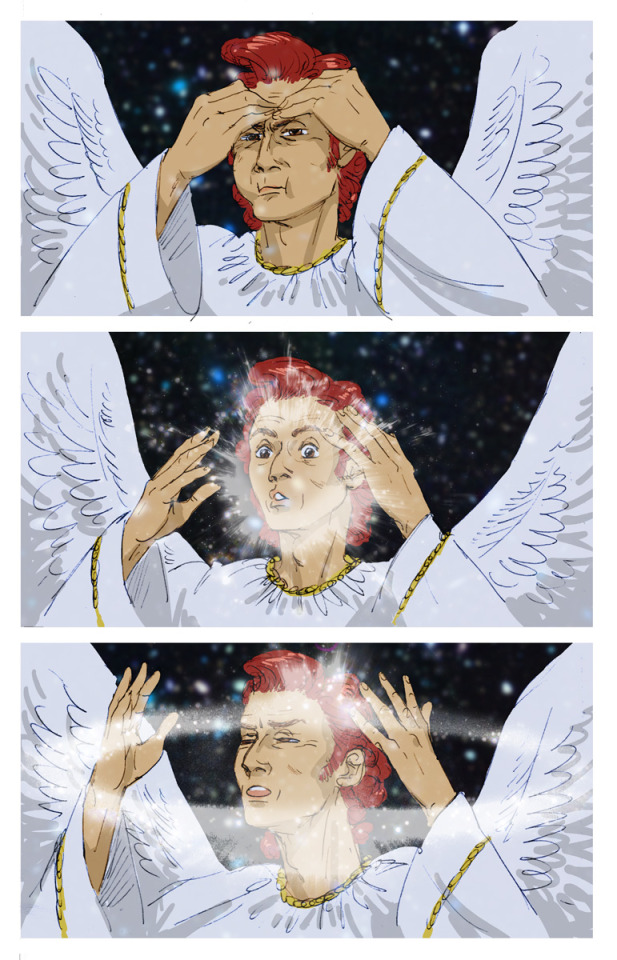
I needed a reaction image so I made one. Galaxy-braining galaxy-maker
#Good Omens#Good Omens 2#Good Omens fanart#angel Crowley#Crowley#tbh this is a reaction image for all your beautiful fanworks and GO meta conspiracy theories - I salute you#man there's so many fanarts I want to draw#Fanart#meme#my art#Joanna Krótka
394 notes
·
View notes
Text
haven't seen anyone talk about this but. after the lightning strike, where did crowley go? because we see him walking away from the bentley after he got Lightly Singed:

and he doesn't walk around the back of it, and get into the driver seat whilst maggie and nina are trapped (second image is the last shot before it cuts to heaven):
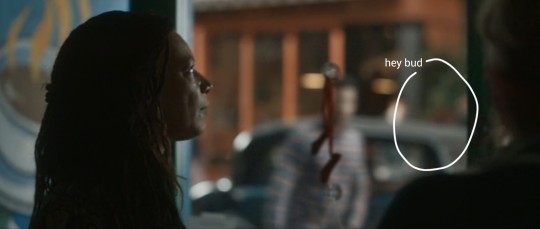
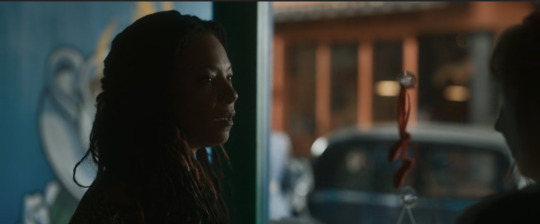
and then we next see him in his hidey spot (that btw im fairly convinced is meant to be in shadwell, london (no, really)), but he's strolling sadly up to the bentley:

could be that there's a really simple explanation for it, like he just needed a walk or something to shake off the residue tantrum, and then parked up and went out for another stroll... or if he walked back to the hidey spot and the bentley just miraculously took itself there/crowley miracled it to meet him there...
...but idk seems strange that he wouldn't just. get straight into the bentley and screech off, pull up in the cobbled street, park, switch off engine, and then the scene launches into beelzebub's fly-arrival...?
#i literally do not care if this doesnt have any ulterior purpose. i do not#i need to survive the s2-s3 and the way im choosing to do it is through conspiracy#its my therapy mind ur business#good omens#not really meta but im gonna tag it so i can come back to it#sanctuary/bentley theory
191 notes
·
View notes
Text

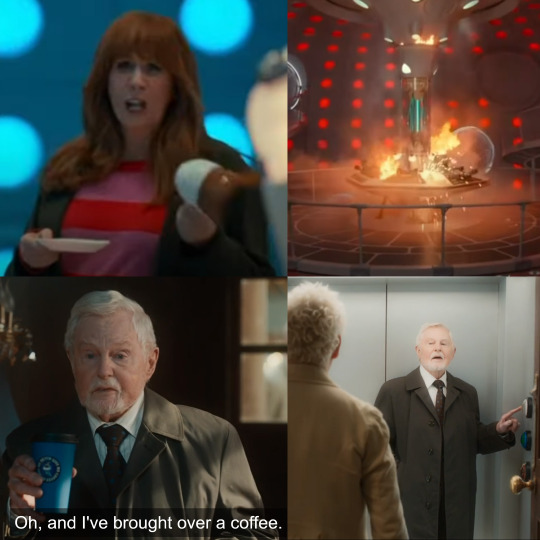
If I had a nickel for every time a David Tennant's immortal, genderfluid character had their day ruined by coffee, I'd have two nickels - which isn't a lot, but it's weird it's happened twice.
#might be time to stick to tea#or alcohol#doctor who#good omens#david tennant#tenth doctor#doctor who spoilers#coffee theory... more like coffee CONSPIRACY#my art
272 notes
·
View notes
Text
Trying to read the crimes on Blackbeard's wanted poster and "unlicensed midwifery" jumped out at me. Bildad the Shuhite, is that you?
#the only other clear one is 'communism'#something about conspiracy theories#bootlegging that's a classic one#and of course plagiarism and improper citations...stay in school kids#Edward Teach#ofmd#ofmd s2#ofmd s2 spoilers#ofmd spoilers#Good Omens#gos2
335 notes
·
View notes
Text
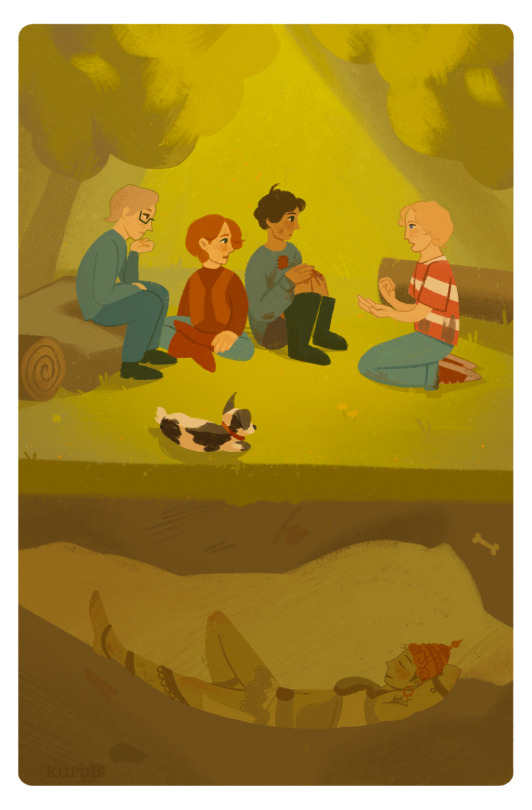
I had to study a many of conspiracy theories for this picture (that’s interesting, it’s was for reason)
#art#digital illustration#digital art#digital drawing#digital painting#character#character art#digital aritst#fanart#original art#good omens 2#good omens fanart#good omens#good omens adam#adam young#adam#pepper good omens#Cerberus#dog#book omens#conspiracy theories#hollow earth
66 notes
·
View notes
Text
New Crazy GOS2 Idea just dropped:
What if the first Crowley/Shax conversation in the park is actually after the end of s2?
"Evidence":
Crowley's sad:

[I can't find a gif, but]
Shax specifically says "If you get wind of anything through your contact in the bookshop let me know"
To which Crowley replies "They don't talk to him anymore"
"your contact" and "they" meaning Muriel, who isn't talking to Aziraphale anymore?? maybe??
#gos2#good omens spoilers#crowley#good omens#shax good omens#good omens theory#good omens conspiracy theories#this is straight up unhinged#so many things are ambiguous this season and it's fucking me up
68 notes
·
View notes
Text
So I was never really behind the 'Crowley was Raphael' conspiracy, as cool as it would be for the plot and my deep love for his character. There is something so endearing about both Crowley and Aziraphale just being some randos who fell in love with each other and humanity, and that's what made them different.
HOWEVER I find it really interesting how some of the vast powers over time/space Crowley has were really emphasized in this season (i mean christ he BUILT it all and HE was the one who said "let there be light", not God). Out of all of the Archangels we have now been introduced to, we are only missing Raphael, who hasn't even gotten so much as a name drop. It's almost as if no one remembers him at all, despite him being so important...
On a COMPLETELY UNRELATED NOTE, they really went all in with the Book of Life name erasure only for it to not amount to anything... I'm sure it's only a coincidence 👀
#good omens#good omens season 2#good omens spoilers#aziraphale#crowley#crowley is raphael#fan theory#neil gaiman i am in your walls#david and michael you too#no one is safe from my conspiracy theories
130 notes
·
View notes
Text
Season 2 Hot Take - We're Being Manipulated

Yes I know this is going to sound like a conspiracy theory, but is it really a conspiracy if its true?
So, as someone who spent the last four years obsessing almost entirely about Gabriel's character and arc (do not get me started on him in S2) and not much else, I feel like I have a different approach to Aziraphale and his actions.
I mean, I'm sorry but I just don't buy the fact that Aziraphale is so deeply traumatized that he would return to heaven just like that. I just don't.
Like, c'mon, season 1 Aziraphale, the utter bastard who straight up lied to God's (metaphorical) face, who got gut punched by some 'bad angels', who was sentenced to death, who tried to talk to God for help and got the run around, merged with season 2 Azirpahale who saw that heaven would just let kids die and not understand why it's bad (also please don't get me started on his 'you really were truly awuful' line, I cannot), who learned the that line between right and wrong is blured and that sometimes graverobbing can be good, who found out he could do magic the real, human way, would not just be like fuck yeah heaven is the good guys let's gooooo.
I just don't buy it. And I want to trust that the writing in season 2 was purposeful and for a reason, because I want to trust that Neil Gaiman knows what he's doing (weird plot-device of the miracle block aside of course because idk how that could possibly be explained properly).
And one of my friends pointed out to me that season 2 was/felt very influenced by the fandom. So what makes the most sense? That Neil Gaiman would just write some really weird and off-character stuff to match what the people want? Or that he would use the fandom's expectations to influence how they react to a situation and event in order to hide what's actually going on?
I mean, look at all the information we're missing.
We don't know what Aziraphale's relationship was like with heaven between seasons (and I'm thinking he had to have some kind of relationship for the Bookshop to still be considered an protected embassy. Because let's face it, vindictive lil heaven isn't gonna keep a triator safe for no good reason).
We don't know the full conversation between Aziraphale and the Metatron (and the fact that Aziraphale's response after the whole Crowley as an angel thing is blocked off is the most interesting tidbit of all. We never actually find out what Aziraphale said, and we know he hadn't given Metatron a real answer before he went to talk to Crowley {yet the Metatron walks in after as if Aziraphale already said yes})
We don't know how and why it was so easy for Gabriel to sneak off after the trial. (Like, I know all the other angels are clueless, but the Metatron has clearly shown himself to have a strategic mind and, let's be honest, he would have seen something like that coming).
There's so much we don't know about, that's being hidden and held back, and we don't question it too much because it's easier to just fill in the blanks with our four years of headcanons and ideas.
And all the posts that Neil Gaiman interact with just further these ideas! I mean, let's face it, he's not gonna like this one because it's too close to the TRUTH (and also because he's busy and there's like a million posts a day but MAINLY BECAUSE OF THE TRUTH)
Aziraphale is a smart character, who knows that heaven is toxic. He's strong and stubborn, and I truely don't believe he's going to just slide right back into that abusive relationship without a Plan. Aziraphale doesn't want to go back to heaven because he knows they aren't really the good guys, but that's the argument he uses because that's the only one he knows how to use. It's his default setting. (and the Metatron is most definitely probably listening in on them so Aziraphale clearly can't say what he actually wants to say, which only contributes to their horrible communication skills).
Aziraphale doesn't need to learn that heaven is in bad shape. He already knows that. But what he didn't know was that he could fix it. He's spent 6,000 years seeing all the cracks in the foundation and not having the power to do anything about it. That's his whole arch in season 1; taking control and doing what he can to fix the wrongs he sees.
But even now the idea that he actually has the power or influence to make the changes he knows are needed is a foreign concept. And the Metatron offering him the job is kind of like Crowley offering him the food. Azirpahale didn't know he could want to actually change things. That he could be the one to put in a suggestion box. He's not going back to learn the hard truth, he's going back to change the hard truth before others have to suffer a similar fate.
Our ideas and expectations were shattered, but that's only because we were coming at it with those expectations. We let them cloud the real story and distract us from the TRUTH.
This whole entire season was a magic act of the highest form using fan-service and shotty writing (dear god please let it be on purpose) as smoke and mirrors. and we're falling for it.
(And while we're on the topic, may I just slip in as an added bonus, Crowley has only himself to blame for Aziraphale thinking him becoming an angel would be a good thing, because how can he expect to go around calling Aziraphale angel all the time and looking at him the way he does and NOT expect Aziraphale to just assume that Crowley thinks being an angel is the best thing since sliced bread????)
#good omens#good omens season 2#good omens season 2 spoilers#good omens theories#good omens season 2 theories#you're not a conspiracy theorist if your theories end up being real#just sayin
56 notes
·
View notes
Text
Okay I'm about to don the tinfoil hat, guys.
Guys, I keep thinking about this season and the end, and I feel like I can't believe everything played out as it seems.
Spoilers ahead.
So.
So like.
You just expect me to believe that after making this big show about how Aziraphale is a traitor and how Crowley is a traitor and blah blah blah The Great Plan and everything and Gabriel being a murderous, power-hungry little bastard, he and Beelzebub just sorta went, "You know what? Nevermind."
And at the end when he gets everything back, that's... That's just sorta it? "Wherever Beelzebub is, that's my Heaven. 😍"
And then they just run away together and everyone's just like, "IDK I guess we'll just erase Aziraphale from the book of life? 🤷♀️" Like why erase Aziraphale for helping Gabriel and not Gabriel who is the one who actually abandoned his duties and ran away?
I DON'T KNOW, I'M JUST SAYING IT ALL SEEMS A LITTLE BIT SHOWY, IS ALL.
Like the whole magic act and the art of misdirection is a REALLY big part of the season, and I'm just SAYING that Aziraphale began the season with his husband and his bookshop, and now he's got neither, and he's being escorted WILLINGLY back to Heaven.
By the angel (is the Metatron an angel or is he something else?) who called Muriel "THE DIM ONE" (which by the way I'm really mad about but that's a post for later) and then within a few minutes was patting them on the head telling them what a good angel they were for reading books now here why don't you come along and bring this independent sanctuary back under Heaven's control. (DON'T THINK I DIDN'T NOTICE THAT SWITCH, METATRON.)
And, maybe, sell a bunch of books (knowledge, power, agency) while you're at it because Muriel probably doesn't even know you're not actually supposed to SELL the books.
The Second Coming is coming, and you've got Aziraphale and Crowley out here doing supreme-archangel-level miracles together. Crowley is powerful enough to access top secret materials. Aziraphale is clever enough to thwart the apocalypse.
And by the end of the season, you've absolutely gutted this powerful free agent who is on nobody's side -- hey maybe now he'll swallow some holy water and be out of everyone's hair -- and you've eliminated the bookshop as a holding ground and you've brought Aziraphale back under Heaven's control.
I'm not saying the WHOLE THING was set up, but... What if the whole thing was set up?! Orchestrated to win Aziraphale's trust back over, and push Crowley so far away he becomes a non-threat? Maybe even easier to eliminate??? Maybe easier for both of them to be eliminated????
Like you're telling me that there just happened to be a neat little folder that Crowley could access, and they just let him see all of it? Because why not? And it just conveniently happened to have all of the things that Gabriel did that somehow no one knew anything about, even though it was all in this folder?
And you're telling me that the archangels who WERE IN A MEETING WITH THE METATRON just SOMEHOW didn't recognize him at all, when Crowley -- who famously "doesn't remember" people (whether that's true or not idk) is the only one who recognizes him???
I'M JUST SAYING, THE LAST EPISODE WAS FUCKING WEIRD OKAY? It was a little too "🤷♀️🤷♀️ oh well I guess this is what happened 🤷♀️🤷♀️" for my taste.
I cannot believe we have to wait two years at minimum for more of this but I guess that's a lot of time to deconstruct what's going on here, eh??
60 notes
·
View notes
Text
Sometimes i think Elena Of Avalor was onto something when it said that the power of forgiveness is better than/more powerful than the power of love
A lot of fandoms are united by their love of the content , but (for me at least) good omens is about forgiving yourself for being human. It accepts that you are human, that one is prone to making mistakes, and it isnt because of your nature/nurture but because you are a person, and thats ok, you were doing your best at the given point of time, things may have gotten out of control and you wish that youd done something else when no longer in the stressful mindset but its ok,its in the past .
For me good omens is about the redeeming quality of forgiveness and how it helps us to accept, forgive and love ourselves.
#It also helps bring out the best in us#Who knew self forgiveness could be this powerful?#good omens#elena of avalor#text posts#I wanted to say that we good omens fans are probably united by BOTH love and self forgiveness but failed to add that in the main post#never mind#Next up is my conspiracy theory about how elena of avalor writers may have also read good omens or other books that give off forgiveness
14 notes
·
View notes
Text
aziraphale hasn't grown a beard in a few centuries just because whenever he does... everyone immediately thinks he's santa. little kids, kindly grandmothers on the bus, literally everyone. and he's too polite to deny it but can you blame them? that angel is not beating the jaunty allegations
#*charlie kelly conspiracy theory meme* can we talk about aziraphale as father christmas? can we talk about it lads#good omens#aziraphale my sweet cheese#aziraphale#he loves cookies... he's joyful... he loves children (sometimes)... he loves making humans happy...#and crowley is an elf that bites
14 notes
·
View notes
Text
CROWLEY=RASPUTIN??!!!
'There was a man in russia long ago' crowley could have been in russia who knows
'His eyes were flaming gold' sounds like someone else we know...
"He could preach the bible like a preacher"- probably in a monotonous bored voice
does crowley go around personally seducing people? nah doesn't seem like the type
and also i dont think crowley would go around chasing mortal girls, like really the guy is an honorable person
so conclusion,
Rasputin was a demon
the demon clearly went too far by lusting and his hunger for power grew...(must have been hastur)
and when they put poison in his wine and after consuming it, he said
"i feel fine"
so really, we need to find a demon with golden eyes and a lust for power(unless that was hasturs old corporation)
#good omens#anthony j crowley#rasputin#boney m#shitpost#shitposting#joke post#silly#random shit#written for shits and giggles really#theory#crack theory#good omens crack#conspiracy theory#conspiracies
9 notes
·
View notes
Text
I want you all to know that I am reading absolutely nothing into the fact that the day the Good Omens Season 2 trailer dropped, Val sent out an email with the subject Ineffable:

I am being extremely normal about this.

#conspiracy theories#and jon hamm has a bigger role this season and he and val were just in tgm together?#I'm just saying#nothing I'm saying nothing#val kilmer#good omens season 2 wild speculation
29 notes
·
View notes
Text
Was anyone else going to say anything about the straight-up SEA SERPENT IN THE LAKE that Aziraphale drives past in Ep. 3? A SEA SERPENT. Right there on the right.

Also, while we're here, are those... Aziraphale and Crowley colered mountains?
#These are the details we'd be spending more time on if the episodes came out once a week#I'm sorry y'all are knee-deep in conspiracy theories while I point out random details of no import#good omens season 2#good omens 2#good omens#go2spoilers#good omens spoilers#good omens easter eggs
21 notes
·
View notes